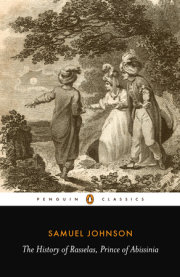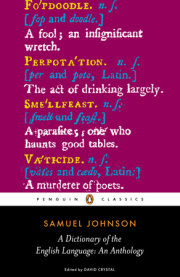SERMON 1Therefore shall a man leave his father, and his mother, and shall cleave unto his wife. Genesis ii.24That society is necessary to the happiness of human nature, that the gloom of solitude, and the stillness of retirement, however they may flatter at a distance, with pleasing views of independence and serenity, neither extinguish the passions, nor enlighten the understanding, that discontent will intrude upon privacy, and temptations follow us to the desert, every one may be easily convinced, either by his own experience, or that of others. That knowledge is advanced by an intercourse of sentiments, and an exchange of observations, and that the bosom is disburdened, by a communication of its cares, is too well known for proof or illustration. In solitude perplexity swells into distraction, and grief settles into melancholy; even the satisfactions and pleasures, that may by chance be found, are but imperfectly enjoyed, when they are enjoyed without participation.
How high this disposition may extend, and how far society may contribute to the felicity of more exalted natures, it is not easy to determine, nor necessary to enquire; it seems however probable, that this inclination is allotted to all rational beings of limited excellence, and that it is the privilege only of the infinite Creator to derive all his happiness from himself.
It is a proof of the regard of God for the happiness of mankind, that the means by which it must be attained, are obvious and evident; that we are not left to discover them, by difficult speculations, intricate disquisitions, or long experience, but are led to them, equally by our passions and our reason, in prosperity and distress. Every man perceives his own insufficiency to supply himself with what either necessity or convenience require, and applies to others for assistance. Every one feels his satisfaction impaired by the suppression of pleasing emotions, and consequently endeavours to find an opportunity of diffusing his satisfaction.
As a general relation to the rest of the species is not sufficient to procure gratifications for the private desires of particular persons; as closer ties of union are necessary to promote the separate interests of individuals, the great society of the world is divided into smaller bodies, and more contracted associations, which pursue, or ought to pursue, a particular interest, in subordination to the publick good, and consistently with the general happiness of mankind.
Each of these subdivisions produces new dependencies and relations, and every particular relation gives rise to a particular scheme of duties. Duties which are of the utmost importance, and of the most sacred obligation, as the neglect of them would defeat all the blessings of society, and cut off even the hope of happiness; as it would poison the fountain from whence it must be drawn, and make those institutions, which have been formed as necessary to peace and satisfaction, the means of disquiet and misery.
The lowest subdivision of society, is that by which it is broken into private families; nor do any duties demand more to be explained and enforced, than those which this relation produces; because none are more universally obligatory, and perhaps very few more frequently neglected.
The universality of these duties requires no other proof than may be received from the most cursory and superficial observation of human life. Very few men have it in their power to injure society in a large extent; the general happiness of the world can be very little interrupted by the wickedness of any single man, and the number is not large of those by whom the peace of any particular nation can be disturbed; but every man may injure a family, and produce domestic disorders and distresses; almost every one has opportunities, and perhaps sometimes temptations, to rebel as a wife, or tyrannize as a husband; and therefore, to almost every one are those admonitions necessary, that may assist in regulating the conduct, and impress just notions of the behaviour which these relations exact.
Nor are these obligations more evident than the neglect of them; a neglect of which daily examples may be found, and from which daily calamities arise. Almost all the miseries of life, almost all the wickedness that infests, and all the distresses that afflict mankind, are the consequences of some defect in these duties. It is therefore no objection to the propriety of discoursing upon them, that they are well known and generally acknowledged; for a very small part of the disorders of the world proceed from ignorance of the laws, by which life ought to be regulated; nor do many, even of those whose hands are polluted with the foulest crimes, deny the reasonableness of virtue, or attempt to justify their own actions. Men are not blindly betrayed into corruption, but abandon themselves to their passions with their eyes open; and lose the direction of truth, because they do not attend to her voice, not because they do not hear, or do not understand it. It is therefore no less useful to rouse the thoughtless, than instruct the ignorant; to awaken the attention, than enlighten the understanding.
There is another reason, for which it may be proper to dwell long upon these duties, and return frequently to them; that deep impressions of them may be formed and renewed, as often as time or temptation shall begin to erase them. Offences against society in its greater extent are cognizable by human laws. No man can invade the property, or disturb the quiet of his neighbour, without subjecting himself to penalties, and suffering in proportion to the injuries he has offered. But cruelty and pride, oppression and partiality, may tyrannize in private families without controul; meekness may be trampled upon, and piety insulted, without any appeal, but to conscience and to Heaven. A thousand methods of torture may be invented, a thousand acts of unkindness, or disregard, may be committed, a thousand innocent gratifications may be denied, and a thousand hardships imposed, without any violation of national laws. Life may be imbittered with hourly vexation; and weeks, months, and years be lingered out in misery, without any legal cause of separation, or possibility of judicial redress. Perhaps no sharper anguish is felt, than that which cannot be complained of, nor any greater cruelties inflicted, than some which no human authority can relieve.
That marriage itself, an institution designed only for the promotion of happiness, and for the relief of the disappointments, anxieties, and distresses to which we are subject in our present state, does not always produce the effects, for which it was appointed; that it sometimes condenses the gloom, which it was intended to dispel, and encreases the weight, which was expected to be made lighter by it, must, however unwillingly, be yet acknowledged. It is to be considered to what causes effects, so unexpected and unpleasing, so contrary to the end of the institution, and so unlikely to arise from it, are to be attributed; it is necessary to enquire, whether those that are thus unhappy, are to impute their misery to any other cause, than their own folly, and to the neglect of those duties, which prudence and religion equally require. This enquiry may not only be of use in stating and explaining the duties of the marriage-state, but may contribute to free it from licentious misrepresentations, and weak objections; which indeed can have little force upon minds not already adapted to receive impressions from them, by habits of debauchery; but which when they co-operate with lewdness, intemperance, and vanity; when they are proposed to an understanding naturally weak, and made yet weaker, by luxury and sloth, by an implicit resignation to reigning follies, and an habitual compliance with every appetite; may at least add strength to prejudices, to support an opinion already favoured, and perhaps hinder conviction, or at least retard it.
It may indeed be asserted to the honour of marriage, that it has few adversaries among men either distinguished for their abilities, or eminent for their virtue. Those who have assumed the province of attacking it, of overturning the constitution of the world, of encountering the authority of the wisest legislators, from whom it has received the highest sanction of human wisdom; and subverting the maxims of the most flourishing states, in which it has been dignified with honours, and promoted with immunities; those who have undertaken the task of contending with reason and experience, with earth and with heaven, are men who seem generally not selected by nature for great attempts, or difficult undertakings. They are, for the most part, such as owe not their determinations to their arguments, but their arguments to their determinations; disputants animated not by a consciousness of truth, but by the numbers of their adherents; and heated not with zeal for the right, but with the rage of licentiousness and impatience of restraint. And perhaps to the sober, the understanding, and the pious, it may be sufficient to remark, that religion and marriage have the same enemies.
There are indeed some in other communions of the Christian church, who censure marriage upon different motives, and prefer celibacy as a state more immediately devoted to the honour of God, and the regular and assiduous practise of the duties of religion; and have recommended vows of abstinence, no where commanded in Scripture, and imposed restraints upon lawful desires; of which it is easy to judge how well they are adapted to the present state of human nature, by the frequent violation of them, even in those societies where they are voluntarily incurred, and where no vigilance is omitted to secure the observation of them.
But the authors of these rigorous and unnatural schemes of life, though certainly misled by false notions of holiness, and perverted conceptions of the duties of our religion; have at least the merit of mistaken endeavours to promote virtue, and must be allowed to have reasoned at least with some degree of probability, in vindication of their conduct. They were generally persons of piety, and sometimes of knowledge, and are therefore not to be confounded with the fool, the drunkard, and the libertine. They who decline marriage for the sake of a more severe and mortified life, are surely to be distinguished from those, who condemn it as too rigorous a confinement, and wish the abolition of it, in favour of boundless voluptuousness and licensed debauchery.
Perhaps even the errors of mistaken goodness may be rectified, and the prejudices surmounted by deliberate attention to the nature of the institution; and certainly the calumnies of wickedness may be, by the same means, confuted, though its clamours may not be silenced; since commonly in debates like this, confutation and conviction are very distant from each other. For that nothing but vice or folly obstructs the happiness of a married life may be made evident by examining,
First, the nature and end of marriage.
Secondly, the means by which that end is to be attained.
First, the nature and end of marriage.
The vow of marriage which the wisdom of most civilized nations has enjoined, and which the rules of the Christian church enjoin, may be properly considered as a vow of perpetual and indissoluble friendship; friendship which no change of fortune, nor any alteration of external circumstances can be allowed to interrupt or weaken. After the commencement of this state there remain no longer any separate interests; the two individuals become united, and are therefore to enjoy the same felicity, and suffer the same misfortunes; to have the same friends and the same enemies, the same success and the same disappointments. It is easy by pursuing the parallel between friendship and marriage, to show how exact a conformity there is between them, to prove that all the precepts laid down with respect to the contraction, and the maxims advanced with regard to the effects, of friendship, are true of marriage in a more literal sense, and a stricter acceptation.
It has been long observed that friendship is to be confined to one; or that to use the words of the axiom, "he that hath friends, has no friend."16 That ardour of kindness, that unbounded confidence, that unsuspecting security which friendship requires, cannot be extended beyond a single object. A divided affection may be termed benevolence, but can hardly rise to friendship; for the narrow limits of the human mind allow it not intensely to contemplate more than one idea. As we love one more we must love another less; and however impartially we may, for a very short time, distribute our regards, the balance of affection will quickly incline, perhaps against our consent, to one side or the other. Besides, though we should love our friends
equally, which is perhaps
not possible; and each according to their
merit, which is
very difficult; what shall secure them from jealousy of each other? Will not each think highly of his own value, and imagine himself rated below his worth? Or what shall preserve their common friend, from the same jealousy, with regard to them? As he divides his affection and esteem between them, he can in return claim no more than a dividend of theirs; and as he regards them equally, they may justly rank some other in equality with him; and what then shall hinder an endless communication of confidence, which must certainly end in treachery at last? Let these reflections be applied to marriage, and perhaps polygamy may lose its vindicators.
It is remarked that "friendship amongst equals is the most lasting," and perhaps there are few causes to which more unhappy marriages are to be ascribed than a disproportion between the original condition of the two persons. Difference of condition makes difference of education, and difference of education produces differences of habits, sentiments, and inclinations. From thence arise contrary views, and opposite schemes, of which the frequent, though not necessary, consequences, are debates, disgust, alienation, and settled hatred.
Strict friendship "is to have the same desires and the same aversions." Whoever is to chuse a friend is to consider first the resemblance, or the dissimilitude of tempers. How necessary this caution is to be urged as preparatory to marriage, the misery of those who neglect it sufficiently evinces. To enumerate all the varieties of disposition, to which it may on this occasion be convenient to attend, would be a tedious task, but it is at least proper to enforce one precept on this head, a precept which was never yet broken without fatal consequences, "let the religion of the man and woman be the same." The rancour and hatred, the rage and persecution with which religious disputes have filled the world, need not to be related; every history can inform us, that no malice is so fierce, so cruel, and implacable, as that which is excited by religious discord. It is to no purpose that they stipulate for the free enjoyment of their own opinion; for how can he be happy, who sees the person most dear to him in a state of dangerous errour, and ignorant of those sacred truths, which are necessary to the approbation of God, and to future felicity? How can he engage not to endeavour to propagate truth, and promote the salvation of those he loves; or if he has been betrayed into such engagements by an ungoverned passion, how can he vindicate himself in the observation of them? The education of children will soon make it necessary to determine, which of the two opinions shall be transmitted to their posterity; and how can either consent to train up in errour and delusion; those from whom they expect the highest satisfactions, and the only comforts of declining life.
Copyright © 2005 by Samuel Johnson. All rights reserved. No part of this excerpt may be reproduced or reprinted without permission in writing from the publisher.








